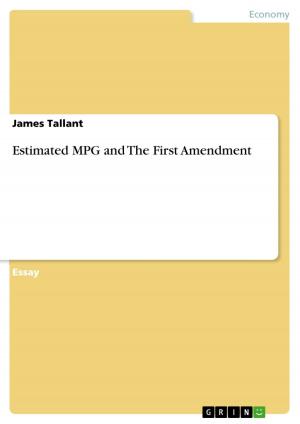The Indo-Sri Lankan Relations at the end of the 1980s': Approaches on India's Involvement in the Sri Lankan Ethnic Conflict facing the Indo-Sri Lankan Accord (29. July 1987)
Nonfiction, Social & Cultural Studies, Political Science, International, International Relations| Author: | Oshrat Becker | ISBN: | 9783638586832 |
| Publisher: | GRIN Publishing | Publication: | February 6, 2007 |
| Imprint: | GRIN Publishing | Language: | English |
| Author: | Oshrat Becker |
| ISBN: | 9783638586832 |
| Publisher: | GRIN Publishing |
| Publication: | February 6, 2007 |
| Imprint: | GRIN Publishing |
| Language: | English |
Seminar paper from the year 2006 in the subject Politics - International Politics - Region: South Asia, grade: 1,0, erg International School - Hebrew University of Jerusalem, Israel (The Social Science Faculty - The Department of International Relations), course: East Asia in the International System, 29 entries in the bibliography, language: English, abstract: In this work the Sri Lankan civil conflict and the Indian involvement at the end of the 1980s is examined by two different theoretical approaches that may fit the case and help describe patterns and actions of both sides. On the one hand two similar theories about regional power and small state behaviour in the face of a civil conflict in the small state by Benjamin Miller are taken out of their original context1 and applied to the case of Sri Lanka. In constituting India as the regional power and Sri Lanka as the small state in these scenarios, it can be examined whether this case can be seen as in accordance with Miller's theories in the main points, and maybe even help to understand the processes around the Indo-Sri Lankan accord better. India will be checked according to its capabilities and interests in the region, which will show, if India's peace keeping role was actually motivated mainly by a regional hegemonic ambition? And the question will be raised, if Sri Lanka accepted the accord out of its own will, or due to Indian dominace? The second theoretical approach is the Two Level Games Theory by Robert Putnam. The Sri Lankan case actually seems to give a very fitting example for the main claims of this theory. Thus the work will look into the questions, if in both countries, India and Sri Lanka, a domestic position was present that supported an agreement like the Indo-Sri Lankan accord, but only through the combination of this inner motivations and outer pressures, made the signing of the accord - against all objectors - come reality? And further, how important were domestic factors in the signing of the accord? The main part of the work will take the first theory, since it asks for plenty material and is also the first place to introduce the most facts and political sequences around the conflict that are not repeated afterwards. Both theories are presented in a short overview and shortened were it was possible, giving an outlineof the theory that is understandable and makes working possible. Many facts, views and materials are only portrayed in outlines, too, and many illuminating quotes to keep the work in its frame and make the reading fluent.
Seminar paper from the year 2006 in the subject Politics - International Politics - Region: South Asia, grade: 1,0, erg International School - Hebrew University of Jerusalem, Israel (The Social Science Faculty - The Department of International Relations), course: East Asia in the International System, 29 entries in the bibliography, language: English, abstract: In this work the Sri Lankan civil conflict and the Indian involvement at the end of the 1980s is examined by two different theoretical approaches that may fit the case and help describe patterns and actions of both sides. On the one hand two similar theories about regional power and small state behaviour in the face of a civil conflict in the small state by Benjamin Miller are taken out of their original context1 and applied to the case of Sri Lanka. In constituting India as the regional power and Sri Lanka as the small state in these scenarios, it can be examined whether this case can be seen as in accordance with Miller's theories in the main points, and maybe even help to understand the processes around the Indo-Sri Lankan accord better. India will be checked according to its capabilities and interests in the region, which will show, if India's peace keeping role was actually motivated mainly by a regional hegemonic ambition? And the question will be raised, if Sri Lanka accepted the accord out of its own will, or due to Indian dominace? The second theoretical approach is the Two Level Games Theory by Robert Putnam. The Sri Lankan case actually seems to give a very fitting example for the main claims of this theory. Thus the work will look into the questions, if in both countries, India and Sri Lanka, a domestic position was present that supported an agreement like the Indo-Sri Lankan accord, but only through the combination of this inner motivations and outer pressures, made the signing of the accord - against all objectors - come reality? And further, how important were domestic factors in the signing of the accord? The main part of the work will take the first theory, since it asks for plenty material and is also the first place to introduce the most facts and political sequences around the conflict that are not repeated afterwards. Both theories are presented in a short overview and shortened were it was possible, giving an outlineof the theory that is understandable and makes working possible. Many facts, views and materials are only portrayed in outlines, too, and many illuminating quotes to keep the work in its frame and make the reading fluent.















